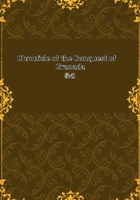
第72章
Queen Isabella was at Vaena, awaiting with great anxiety the result of the expedition. She was in a stately apartment of the castle looking toward the road that winds through the mountains from Moclin, and regarding the watch-towers on the neighboring heights in hopes of favorable signals. The prince and princess, her children, were with her, and her venerable counsellor, the grand cardinal. All shared in the anxiety of the moment. At length couriers were seen riding toward the town. They entered its gates, but before they reached the castle the nature of their tidings was known to the queen by the shrieks and wailings from the streets below. The messengers were soon followed by wounded fugitives hastening home to be relieved or to die among their friends and families. The whole town resounded with lamentations, for it had lost the flower of its youth and its bravest warriors. Isabella was a woman of courageous soul, but her feelings were overpowered by spectacles of woe on every side: her maternal heart mourned over the death of so many loyal subjects, who shortly before had rallied round her with devoted affection, and, losing her usual self-command, she sank into deep despondency.
In this gloomy state of mind a thousand apprehensions crowded upon her. She dreaded the confidence which this success would impart to the Moors; she feared also for the important fortress of Alhama, the garrison of which had not been reinforced since its foraging party had been cut off by this same El Zagal. On every side she saw danger and disaster, and feared that a general reverse was about to attend the Castilian arms.
The grand cardinal comforted her with both spiritual and worldly counsel. He told her to recollect that no country was ever conquered without occasional reverses to the conquerors; that the Moors were a warlike people, fortified in a rough and mountainous country, where they never could be conquered by her ancestors; and that, in fact, her armies had already, in three years, taken more cities than those of any of her predecessors had been able to do in twelve. He concluded by offering to take the field himself with three thousand cavalry, his own retainers, paid and maintained by himself, and either hasten to the relief of Alhama or undertake any other expedition Her Majesty might command. The discreet words of the cardinal soothed the spirit of the queen, who always looked to him for consolation, and she soon recovered her usual equanimity.
Some of the counsellors of Isabella, of that politic class who seek to rise by the faults of others, were loud in their censures of the rashness of the count. The queen defended him with prompt generosity. "The enterprise," said she, "was rash, but not more rash than that of Lucena, which was crowned with success, and which we have all applauded as the height of heroism. Had the count de Cabra succeeded in capturing the uncle, as he did the nephew, who is there that would not have praised him to the skies?"
The magnanimous words of the queen put a stop to all invidious remarks in her presence, but certain of the courtiers, who had envied the count the glory gained by his former achievements, continued to magnify, among themselves his present imprudence; and we are told by Fray Antonio Agapida that they sneeringly gave the worthy cavalier the appellation of count de Cabra the king-catcher.
Ferdinand had reached the place on the frontier called the Fountain of the King, within three leagues of Moclin, when he heard of the late disaster. He greatly lamented the precipitation of the count, but forbore to express himself with severity, for he knew the value of that loyal and valiant cavalier.* He held a council of war to determine what course was to be pursued. Some of his cavaliers advised him to abandon the attempt upon Moclin, the place being strongly reinforced and the enemy inspirited by his recent victory.
Certain old Spanish hidalgos reminded him that he had but few Castilian troops in his army, without which stanch soldiery his predecessors never presumed to enter the Moorish territory, while others remonstrated that it would be beneath the dignity of the king to retire from an enterprise on account of the defeat of a single cavalier and his retainers. In this way the king was distracted by a multitude of counsellors, when, fortunately, a letter from the queen put an end to his perplexities. Proceed we in the next chapter to relate what was the purport of that letter.
*Abarca, Anales de Aragon.